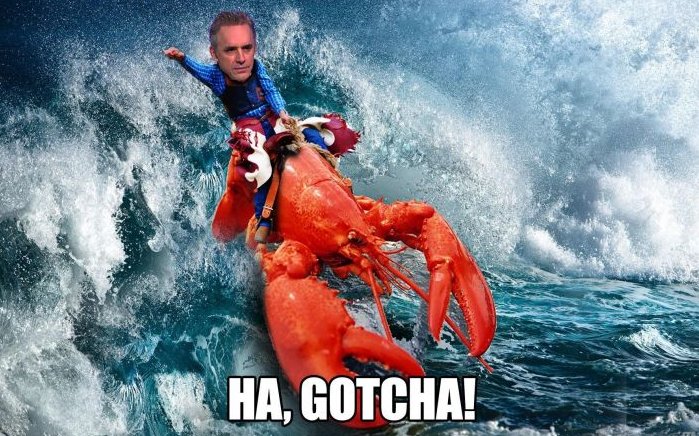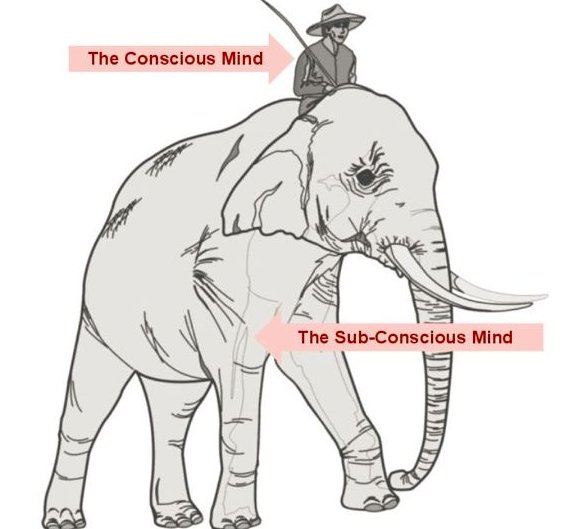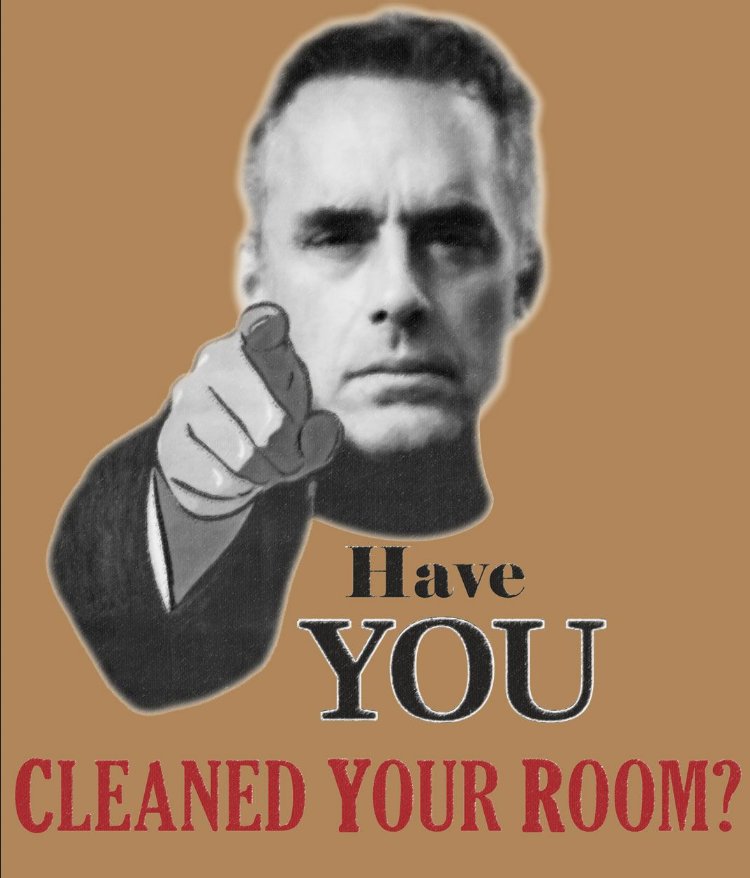I have a different version of this that has fewer sparkles and rainbows but the same bottom line.
Self-talk, self-love and psychological attitude might seem like nonsense but they're only nonsense if you think of a person as something like a robot https://twitter.com/metaLulie/status/1321994380794888193
https://twitter.com/metaLulie/status/1321994380794888193
Self-talk, self-love and psychological attitude might seem like nonsense but they're only nonsense if you think of a person as something like a robot
 https://twitter.com/metaLulie/status/1321994380794888193
https://twitter.com/metaLulie/status/1321994380794888193
Lower animals like mosquitoes don't need self-love. They are basically robots that happen to be made out of biological materials, they have a program that evolution found that facilitates them fulfilling their implicit utility function (survival and reproduction).
If you imagine yourself writing the code for a blood-sucking, flying robot, why would you put in things like self-doubt and the need for self-love?
You wouldn't! There's no purpose for such code, so it's just not there.
You wouldn't! There's no purpose for such code, so it's just not there.
Now a creature like that might have a mode akin to depression which kicked in when it was running out of calorie reserves and needed to conserve energy or die.
But you wouldn't be able to cure that with "self-love", you'd cure it with food.
But you wouldn't be able to cure that with "self-love", you'd cure it with food.
So why do humans have all this stuff?
It seems to be the case that all animals with something like a social pecking order have a "self-ability-assessment-module" that tries to assess how a creature is doing in the pecking order, and change behavior accordingly.
It seems to be the case that all animals with something like a social pecking order have a "self-ability-assessment-module" that tries to assess how a creature is doing in the pecking order, and change behavior accordingly.
Human antidepressants work on lobsters (and on many other nonhuman animals) (cue many Jordan Peterson memes), which is evidence for the claim that this stuff (depression) is a widespread, evolved mechanism.
So why does being depressed or even committing suicide make evolutionary sense? There isn't a solid answer to this, but depression may be partly explained as a low-reward, low risk set of behaviors as a response to failure that were adaptive in the past but aren't any more.
Suicide may be the final stage of this, via kin altruism.
Your brain detects repeated failure via its low-level heuristics and tells you to self-terminate in order to conserve the resources of your family.
Your brain detects repeated failure via its low-level heuristics and tells you to self-terminate in order to conserve the resources of your family.
The key point of all this stuff is that for social beings 𝘪𝘵 𝘮𝘢𝘬𝘦𝘴 𝘴𝘦𝘯𝘴𝘦 𝘵𝘩𝘢𝘵 𝘰𝘶𝘳 𝘦𝘭𝘦𝘱𝘩𝘢𝘯𝘵 𝘥𝘰𝘦𝘴𝘯'𝘵 𝘢𝘭𝘸𝘢𝘺𝘴 𝘸𝘢𝘯𝘵 𝘶𝘴 𝘵𝘰 𝘱𝘦𝘳𝘧𝘰𝘳𝘮 𝘢𝘵 𝘱𝘦𝘢𝘬 𝘢𝘣𝘪𝘭𝘪𝘵𝘺 𝘢𝘯𝘥 𝘴𝘰𝘮𝘦𝘵𝘪𝘮𝘦𝘴 𝘦𝘷𝘦𝘯 𝘸𝘢𝘯𝘵𝘴 𝘵𝘰 𝘬𝘪𝘭𝘭 𝘶𝘴.
In the modern environment our built-in self-failure-detection-subroutines are subject to huge errors because they can't see context, and you absolutely have to actively manage them.
When I was the best math student in my high school of 1000 people, I was extremely happy about math and about academics in general.
When I went to Cambridge Part III and hung out with the most highly selected groups of young mathematicians in the world, I became depressed.
When I went to Cambridge Part III and hung out with the most highly selected groups of young mathematicians in the world, I became depressed.
But that doesn't really make sense, because I didn't get worse at math. I just got worse relative to a context that shifted several standard deviations upwards.
The elephant doesn't understand context.
The elephant doesn't understand context.
A person is actually two robots, not one; they share the same head.
The conscious, intelligent, language-using robot is (in some sense) actually you. It makes plans and it makes excuses and delivers public relations speeches.
The conscious, intelligent, language-using robot is (in some sense) actually you. It makes plans and it makes excuses and delivers public relations speeches.
The other robot is much less intelligent, doesn't seem to be conscious and is almost more like a complicated thermostat.
Robin calls this the "Elephant" in the brain.
Robin calls this the "Elephant" in the brain.
But the elephant is extremely powerful and kind of has root privileges; it expects the more intelligent language-using rider to mostly do its bidding and make excuses for bad behavior that is adaptive.
In small villages it's likely that whatever the elephant wanted you to do was actually actually the right thing to do (in the selfish sense, of course). Eat food! Select mates! Fight rivals! Reproduce!
If your elephant made you depressed, it might have been for a really good reason like that your village had been conquered by an invading tribe and they'd kill anyone who made too much fuss; being depressed, withdrawn and quiet was adaptive.
In modern life in developed countries, being depressed or killing yourself is much, much less likely to be adaptive and much more likely to be caused by your elephant making a context mistake.
Modern hierarchies give almost unlimited upside to activity, to trying harder, to prolificness, whilst at the same time providing huge amounts of psychologically toxic negative feedback.
People who get depressed about their math homework or their job might in some sense be trying to protect themselves from an imaginary foe who will kill them for making mistakes.
Withdrawing from unpleasant activities is an attempt to execute a strategy of leaving dangerous or maladaptive situations.
But the elephant lacks intelligence. It doesn't understand that you HAVE to pay that bill and putting it off will make it worse with ~100% probability.
But the elephant lacks intelligence. It doesn't understand that you HAVE to pay that bill and putting it off will make it worse with ~100% probability.
It doesn't understand that math homework is absolutely not something you can just skip and be better off. Every single child in the country has to do it and your failure to do it is recorded in a database and that failure will follow you around for life and reduce your fitness.
So what is this stuff about "unconditional self love"?
It's an attempt to hack your elephant into believing that you're doing well so that it doesn't put you into depression mode, which is often maladaptive (and therefore a mistake)! in modern life.
It's an attempt to hack your elephant into believing that you're doing well so that it doesn't put you into depression mode, which is often maladaptive (and therefore a mistake)! in modern life.
By the way, most of the time depression is maladaptive as well as being against your (the rider's) values.
The rider and the elephant have pretty well-aligned values in this area. It's just that the elephant is kind of stupid, but unfortunately very powerful.
The rider and the elephant have pretty well-aligned values in this area. It's just that the elephant is kind of stupid, but unfortunately very powerful.
Addendum: the Elephant/Rider metaphor goes back at least to @JonHaidt
So when people "love themselves" and do "self care" and all those other things it's actually rational behavior for a rider-on-elephant.
Also things like spending money on nice clothes, fast cars, expensive vacations etc isn't pure consumption behavior.
Also things like spending money on nice clothes, fast cars, expensive vacations etc isn't pure consumption behavior.
It's "elephant stroking".
"There, there elephant; I'm doing well in life there's no need to put me into a depression state"
Not doing enough elephant stroking (and even actively harming the elephant) is a horrible failure mode that basic-bitch rationality causes.
"There, there elephant; I'm doing well in life there's no need to put me into a depression state"
Not doing enough elephant stroking (and even actively harming the elephant) is a horrible failure mode that basic-bitch rationality causes.
"Oh, this nice car I want to buy is money I could spend on saving children in Africa/I could donate to AI safety research/some other efficient charity"
The result of an overdose of this is predictably a rebellion by your elephant, which then causes massive damage.
The result of an overdose of this is predictably a rebellion by your elephant, which then causes massive damage.
Also too much negative feedback such as the famous "Crocker's Rules" encouraging rude negative feedback. Rude negative feedback has both costs and benefits. Crocker seems to have only identified the benefit (better info) not the cost (risk of depression).
https://wiki.lesswrong.com/wiki/Crocker%27s_rules
https://wiki.lesswrong.com/wiki/Crocker%27s_rules
A good rule of thumb I have heard is that you have to say 5 positive things to a person for each negative thing. A more accurate version of Crocker's Rules might include this.
One might also come up with a rule of thumb for how much luxury spending is efficient to achieve a goal
One might also come up with a rule of thumb for how much luxury spending is efficient to achieve a goal
Why does the basic Jordan Peterson advice of tidying your room work so well? Because the elephant is smart enough to update its internal assessment of how well you are doing by looking at your room and associating squalid with low-status and failure.
The elephant is not smart enough to understand that it can get stuck in loops like this (and many similar ones):
depression --> inactivity --> messy room --> elephant detects failure --> depression
depression --> inactivity --> messy room --> elephant detects failure --> depression
It is shocking that we can do things that are so obviously maladaptive, but in the past other effects were likely more important.
Outcomes may have been much less affected by your own actions and much more by social games, which is why the elephant is so obsessed with how other people treat you, and not interested enough in paying bills on time, making investments, getting professional skills/quals, etc.
Our elephants are just wildly maladapted for the modern world with its strong property rights, powerful states, impersonal databases that follow you around for life even though you never see them, limitless opportunities, unprecedented physical safety, etc.
Rationally, why should we care if our boss at work is an asshole who treats us badly?
Given the physical safety and explicit financial rewards for work, it's pretty easy to just calculate whether the job is good and mostly ignore the boss' personality.
Given the physical safety and explicit financial rewards for work, it's pretty easy to just calculate whether the job is good and mostly ignore the boss' personality.
But the elephant cares a lot because it is in some sense expecting the nasty boss to kill you or maybe burn your house down, or perhaps just starve you to death when the next famine comes.
S/He's sending a signal and your elephant is buying it and making us ready for terrible things that will never happen, just like it makes us eat cookies and get fat in preparation for the immanent famine, and sees calories as a limitless positive thing with no downside.
I see depression and obesity as similar: diseases of paradise, and with similar solutions. I mostly don't buy cookies. I just don't let my elephant see them. I think we should take a similar approach to depression: shield your elephant from correlates of low status/failure.
Tidy your room, interact with nice people. Get 5 nice experiences for each hard/negative one. And love yourself like a rider loving her errant elephant but also understanding how it can get hurt and confused.
□
□

 Read on Twitter
Read on Twitter








